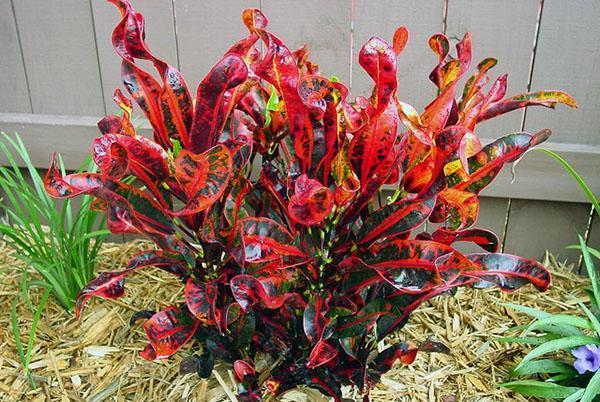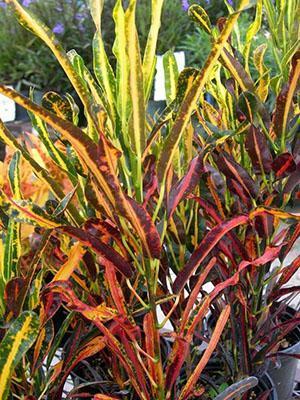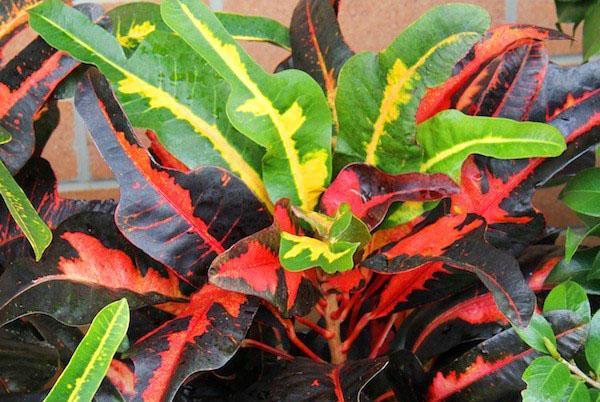Photo and description of croton varieties
 Croton is a unique culture in many ways. In the photo, croton amazes with the splendor of colors and a variety of leaf shapes. It is difficult to believe that the foliage of plants within the same species can be elongated-lanceolate, round and pointed-elliptical, three-toed or oval. And where have you seen that leaves on living and healthy trees and shrubs curl into curls or turn into a regular spiral?
Croton is a unique culture in many ways. In the photo, croton amazes with the splendor of colors and a variety of leaf shapes. It is difficult to believe that the foliage of plants within the same species can be elongated-lanceolate, round and pointed-elliptical, three-toed or oval. And where have you seen that leaves on living and healthy trees and shrubs curl into curls or turn into a regular spiral?
If on other ornamental crops such behavior of the foliage would be considered a manifestation of the disease or the consequences of the encroachment of pests, then for Croton, the variegated codiaum, as this species is correctly called, this is amazing, but the norm.
Many-faced croton or motley codiaum

A perennial evergreen has an erect, branching stem covered with large dense foliage. Being in favorable conditions, in nature or with home keeping, croton can grow up to 3-4 meters, but it is hardly possible to see such a giant grown in a pot. Most often indoor crotons, as in the photo, is much smaller and does not exceed 50–100 cm in height.
 The large leathery leaves of croton cannot be forgotten due to the variety of colors that coexist in the most unexpected way on the leaf plates and remain bright throughout the year, regardless of the season. Moreover, in most varieties, as in the presented photo of croton, contrasting veins stand out on the leaves.
The large leathery leaves of croton cannot be forgotten due to the variety of colors that coexist in the most unexpected way on the leaf plates and remain bright throughout the year, regardless of the season. Moreover, in most varieties, as in the presented photo of croton, contrasting veins stand out on the leaves.
The unique gamut and variety of foliage forms is the main, attractive force that made the variegated codiaum or croton one of the most popular indoor plants in the world.
Croton Flower: Cinderella at the Royal Ball
 At the same time, not all growers can say that they saw how croton blooms. Although the inflorescences of this plant cannot compete with the foliage either in size, shape or brightness of shades, they are also worthy of attention. Loose racemose inflorescences are formed in the leaf axils and combine 1.5-2 dozen small whitish flowers. Croton flowers are divided into male and female specimens, opening simultaneously, but located on different inflorescences.
At the same time, not all growers can say that they saw how croton blooms. Although the inflorescences of this plant cannot compete with the foliage either in size, shape or brightness of shades, they are also worthy of attention. Loose racemose inflorescences are formed in the leaf axils and combine 1.5-2 dozen small whitish flowers. Croton flowers are divided into male and female specimens, opening simultaneously, but located on different inflorescences.
The first ones are easy to recognize by the presence of small bent petals and fluffy stamens, thanks to which they look like small pompons.
 But the female croton flowers, as in the photo, are unobtrusive and unattractive, like Cinderella, who lost her shoe and the royal castle sparkling with lights.
But the female croton flowers, as in the photo, are unobtrusive and unattractive, like Cinderella, who lost her shoe and the royal castle sparkling with lights.
Croton classification: photos of varieties and varieties
 All specimens of codiaeum croton grown in indoor conditions are numerous hybrid forms belonging to one botanical species Codiaeum variegatum, which can rightfully be considered unique among other plant communities. This becomes clear if we consider the representatives of this species of Croton in the photo.
All specimens of codiaeum croton grown in indoor conditions are numerous hybrid forms belonging to one botanical species Codiaeum variegatum, which can rightfully be considered unique among other plant communities. This becomes clear if we consider the representatives of this species of Croton in the photo.
Not only are such images literally stunning with a riot of tropical colors, but they also surprise with the variety of shapes of leaf plates. It is on the latter basis that the modern classification of crotons is conducted.In addition to plants with oval, elongated-lanceolate or pointed-elliptical leaves, today there are more bizarre varieties and hybrids at the disposal of flower growers.
 The three-lobed, trilobium, and lobed, lobatum form of croton has large leaves in three parts, resembling the foliage of an oak or fig in shape. There are also more exotic varieties with strongly separated or narrowed lateral lobes. An example of a three-bladed form is the Croton Excelent variety known to flower growers with decorative variegated foliage.
The three-lobed, trilobium, and lobed, lobatum form of croton has large leaves in three parts, resembling the foliage of an oak or fig in shape. There are also more exotic varieties with strongly separated or narrowed lateral lobes. An example of a three-bladed form is the Croton Excelent variety known to flower growers with decorative variegated foliage.
 The narrow-leaved, or angustifolium, form of croton is very popular among flower growers. Plants have long, linear foliage that grows up to 20–40 cm, decorated with many green spots scattered over a dark green background. An example of such a croton flower in the photo clearly demonstrates the unique appearance of the plant.
The narrow-leaved, or angustifolium, form of croton is very popular among flower growers. Plants have long, linear foliage that grows up to 20–40 cm, decorated with many green spots scattered over a dark green background. An example of such a croton flower in the photo clearly demonstrates the unique appearance of the plant.
 The appendage or appendiculatum form of the croton leaf, as in the photo, can be considered one of the most amazing in the plant world. The leaf plate is ovoid or lanceolate, narrowing towards the apex, turns into a kind of second cutting, which after some gap expands again, forming a continuation of the leaf plate.
The appendage or appendiculatum form of the croton leaf, as in the photo, can be considered one of the most amazing in the plant world. The leaf plate is ovoid or lanceolate, narrowing towards the apex, turns into a kind of second cutting, which after some gap expands again, forming a continuation of the leaf plate.
 Croton plants, as in the photo, have predominantly green foliage, but there are variegated specimens.
Croton plants, as in the photo, have predominantly green foliage, but there are variegated specimens.
Plants with unusual curly foliage always cause a lot of surprise and admiration.
 At the same time, in the photo, crotons of the crispum variety can have completely different sizes and colors, from spotty yellow-green to crimson, pink, purple or almost black.
At the same time, in the photo, crotons of the crispum variety can have completely different sizes and colors, from spotty yellow-green to crimson, pink, purple or almost black.
 Another unique creation of nature - a spiral form, a variety of cultivated plants of the subspecies Spirale have elongated linear leaves, which gradually twist into a spiral around the central vein. The color and degree of curl vary considerably from plant to plant.
Another unique creation of nature - a spiral form, a variety of cultivated plants of the subspecies Spirale have elongated linear leaves, which gradually twist into a spiral around the central vein. The color and degree of curl vary considerably from plant to plant.
Croton plants of the volutum form acquire an unusual rounded shape. Their foliage is strongly curved along the central vein so that all the tips of the leaves are turned into the crown.
I, out of experience, froze the craton all the leaves fell down, only the stem remained how to revive
the stem seems to be dry, very dry, I don't know what to do 4 months have passed without changes, I water it a little bit
also benjamin, too, in the same condition, please help me with these plants for almost 3-4 years, benjamin grew well 60-65 cm, I had a hard time craton, but it was 16-17 leaves already help I don't want to throw my soul away hurting how can I revive .Thank !
If possible, take a photo of your plants and show us those photos.
hello, I will show you a photo of my craton (codiaum) while the state of the craton and bedjamin is the same